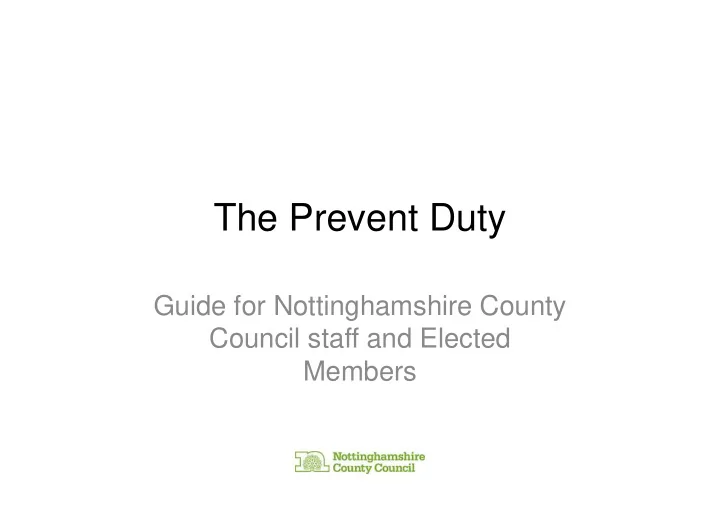

The Prevent Duty Guide for Nottinghamshire County Council staff and Elected Members
Why? Local authorities, in the exercise of their functions, must have “due regard to the need to prevent people from being drawn into terrorism.” (Counter Terrorism & Security Act 2015 )
What is the Prevent Duty? Prevent is part of the Government’s counter-terrorism strategy. The Prevent Duty aims to prevent people from being drawn into terrorism by: • Responding to the ideological challenge of terrorism. • Working with sectors and institutions where there are risks of radicalisation. Prevent adopts a multi-agency approach to safeguard and support vulnerable people at risk of radicalisation and extremism.
What are Local Authority responsibilities? Coordinate Prevent using multi-agency groups. • • Assess risk of residents being drawn into terrorism using counter-terrorism local profile (CTLP). • Develop an action plan to reduce the risk. • Train staff to recognise radicalisation and extremism. • Refer vulnerable people to Channel. • Establish responsible booking policy for public venues. • Refrain from working with extremist organisations. The Home Office can (and already does) scrutinise local Prevent action plans, project impact and overall performance.
What are the warning signs? Every case is unique and this is not an exhaustive list. Sometimes there are clear warning signs and in other cases they are less obvious. • Refusal to engage with people on • Changes in behaviour grounds of race, gender etc. • More argumentative • Excessive time online • Unwilling to consider other points • Accessing extreme material of view • Changes in social media profiles • Belief in conspiracy theories • Increased secrecy • Distancing from friends/peers • Sympathy for extreme groups • Recent conversion to new faith • Joining extreme organisations • Significant change in appearance • In contact with extremist recruiters • Rejection of previously enjoyed activities
Why should I report a concern? Remember that Prevent is no different to any other form of safeguarding. Notice-Check-Share • Have you noticed something of concern? • Ask the opinion of someone you trust to see if they agree. • Follow local guidelines and report concerns to your designated safeguarding lead or Prevent SPOC. We ALL have a duty to safeguard people and prevent radicalisation.
What is the reporting process? If you have any immediate or ongoing concerns about a potential Prevent referral or situation, or if you would like some further advice about Prevent either contact: • Nottinghamshire Police Prevent Team: • Phone: 101 Ext 800 2962/2963 • Email: prevent@nottinghamshire.pnn.police.uk • Or complete: • an East Midlands Prevent Referral Form (Intranet)
Recommend
More recommend